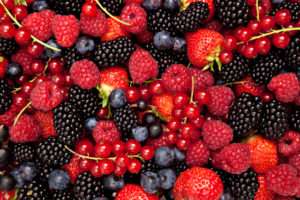Eat Your Berries!
The Science About Berries
 Flavonoids are phytochemicals that continue to be researched, but one thing is clear, their health promoting properties are noteworthy. They improve memory, are powerful free-radical scavengers, prevent blood clots, protect against oxidation of LDL and lower high blood pressure, reduce inflammation and bolster immune function. Studies are beginning to show that flavonoids may help prevent the development of Alzheimer’s disease, relieve chronic fatigue syndrome and slow down aging.
Flavonoids are phytochemicals that continue to be researched, but one thing is clear, their health promoting properties are noteworthy. They improve memory, are powerful free-radical scavengers, prevent blood clots, protect against oxidation of LDL and lower high blood pressure, reduce inflammation and bolster immune function. Studies are beginning to show that flavonoids may help prevent the development of Alzheimer’s disease, relieve chronic fatigue syndrome and slow down aging.
Blueberries
One of the best sources of flavonoids is berries, with blueberries being rated the highest by the United States Department of Agriculture (USDA), having the capacity to pack in the most antioxidants. When compared to 40 other fresh fruits and vegetables, blueberries were rated #1 in antioxidant activity. Blueberries are associated with numerous health benefits including protection against urinary-tract infections, cancer, age-related health conditions and brain damage from strokes, reducing the build-up of “bad” cholesterol or LDL, which research has shown contributes to heart disease and strokes. Blueberries are also an excellent source of many vitamins and minerals to include vitamins A and C, Potassium, Iron and Calcium.
Strawberries, Raspberries and More
Second only to blueberries, strawberries are packed with antioxidants and healthful phytochemicals, being rich in dietary fiber and manganese as well as containing more vitamin C than any other berry. Raspberries are relatively low in sugar compared to most other fruits, they have the added benefit of being packed with antioxidants, and are high in anthocyanin’s (a powerful antioxidant) and other cancer-fighting phytochemicals. Raspberries also contain calcium and vitamins A, C and E while being high in soluble fiber, which lowers cholesterol, and these great snack able berries have been found to protect against some forms of cancer. Blackberries are low in saturated fat, cholesterol and sodium. They are a great source of vitamin C, E and K, Folate, Magnesium and Potassium as well as dietary fiber and manganese. The darker the color fruit, the higher it is in vitamins, minerals, antioxidants and other important healthful nutrients; so, blackberries are an excellent choice for a berry snack.
How To Store Your Fruits
As with most whole food purchases, they should be made in moderation as fruits will typically only stay fresh for three or four days. Most berries are best refrigerated, unwashed and in their original container. This should keep them from getting soft as well as keep them fresh for consumption. It is best to purchase organic berries. Research has proven that non-organic are less healthful than their whole-food counterparts. Scientists believe this is because the pesticides and other chemicals used by conventional growers hamper the plants’ production of phenolic or flavonoids. Conventionally grown strawberries, one of the most toxic laden food available, act like a sponge when sprayed with pesticides and other chemicals, absorbing them at an alarming rate. Organic fruits have been proven to contain 40% more antioxidants and higher levels of beneficial vitamins and minerals.
How To Avoid High Calories
Never juice or blend your berries. A smoothie typically includes yogurt or milk, adding saturated fat to a naturally fat-free snack, boosting the calorie count from a healthy 53 calories for a cup of fresh strawberries to a diet-busting 350 calories for one smoothie. Even the smoothies offered at the healthiest of establishments are providing you with five to six servings of fruit instead of the one or two servings you would typically consider a snack, taking your carbohydrate intake from a moderate 13 grams to an insulin-inducing 50 grams or more. Juicing is equally detrimental as it typically means removing from the fruit the fiber-rich flesh of the fruit, which is really the best part for you. Finally, do not ever be fooled by a “fruit roll-up” or other so-called “fruit” snacks as they are more sugar and additives than fruit. The typical fruit snack has sugar in the top three ingredients along with partially hydrogenated oils, corn syrup and emulsifiers. This will never be a healthy snack option, no matter how they try to market it. Berries are proven to be rich in antioxidants and carcinogen-fighting phytochemicals. Recent studies have even proven that adding just one serving a day of berries to your diet can lower your blood pressure and improve your HDL (good cholesterol) levels. Every way you look at it, berries are a better choice.



